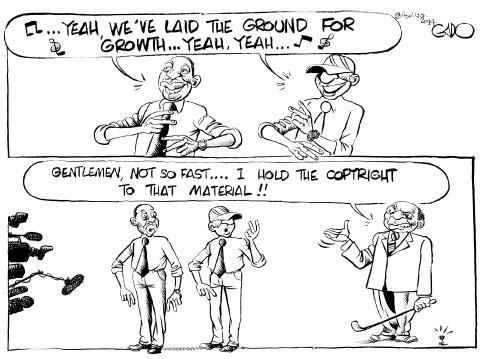
As many readers may know, the Jubilee government of President Uhuru Kenyatta, his Deputy William Ruto and his Cabinet mark the end of their first year in office this month. To this end, Gado’s comic in today’s Daily Nation newspaper depicts Kenyatta and Ruto being accused of copyright infringement by the immediate former president Kibaki. The message is clear: the Jubilee government is literally singing the same tune as the previous government.
As this blogger has previously noted, Kenyatta has been very supportive of the creative economy and has on several occasions reiterated his administration’s commitment to creating a conducive environment for creators to reap from their intellectual property (IP) assets. However, Kenyatta’s lasting mark on IP in the past year was the decision to reform all state corporations and parastatals in Kenya which has set in motion plans to merge the copyright office, the industrial property office and the anti-counterfeit agency into one national IP office. (See this blogger’s comments on the merger here and here).
According to recent media reports, the heads of the various government parastatals spent the month of March at the Kenya School of Government deliberating and making recommendations to the Jubilee Government on the best ways to merge the various state agencies across the various sectors, including intellectual property administration and enforcement. Unconfirmed whispers received by this blogger indicate that the proposed name for the new IP body is the Intellectual Property Organisation of Kenya (IPOK) which will be composed of three directorates (Copyright and Related Rights, Industrial Property and Anti-Counterfeit). This new body, IPOK, will be run by a Director-General, much like the African Regional Intellectual Property Organisation (ARIPO) or the World Intellectual Property Organisation (WIPO).
Regardless of the new IP body’s format, it is clear that members of the Jubilee Cabinet will play a crucial role to ensure that this body functions smoothly and delivers on the expectations of Kenyans. In particular, the Cabinet Secretaries in charge of Industrialisation, Justice and Culture will play the greatest role to midwife and steer the operationalisation of the proposed IP body. In a recent publication titled “Cabinet Scorecard”, the Star newspaper used the following rating to gauge the performance of the Jubilee Cabinet over the past year:
“A. You are doing an excellent job
B. Good, but room for improvement
C. You are okay
D. Get your act together
E. Resign
F. Please fire him, Mr President”
According to the Star, no member of the Executive obtained an “A” grade with Kenyatta being the highest scorer with a “B” grade. The Cabinet Secretary for Industrialisation, Adan Mohammed was among the lowest scorers with a “D” grade.
The scorecard reads in part:
“A year later, no one can say with certainty whether he [Mohammed] has done anything let alone inspire change. Nothing much has been heard of his ministry and nothing has reverberated on the ground from the golden touch everyone expected from him…It is no surprising therefore that in the ministry’s website, only three events appear in the “news and events” category one year later.”
Many will recall that Mohammed’s docket is the parent ministry for two out of the three IP agencies to be merged, namely the Kenya Industrial Property Institute (KIPI) and the Anti-Counterfeit Agency (ACA). Furthermore, it is widely speculated that the Industrialisation Ministry may be charged with direct oversight and supervision over the new IP body.
As the Jubilee government enters the second year of its administration, this blogger will continue to review the highs and lows of the Executive, including the current national IP offices, in promoting, supporting and protection the IP rights of the Kenyans.

